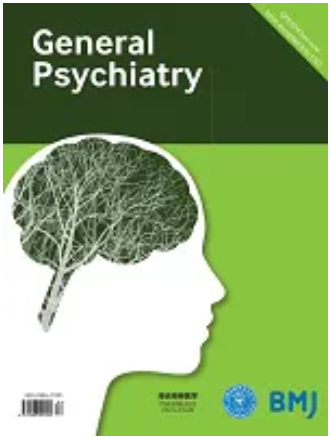抑郁症患者自述服用抗抑郁药后体重指数偏高的几率增加
IF 5.3
3区 医学
Q1 PSYCHIATRY
引用次数: 0
摘要
致编辑抑郁症和肥胖症的发病率呈上升趋势,给公众健康带来了极大的隐患。单胺类抗抑郁药,如选择性血清素再摄取抑制剂(SSRIs)和血清素-去甲肾上腺素再摄取抑制剂(SNRIs),是治疗重度抑郁症的一线选择。研究强烈支持使用抗抑郁药与体重增加之间的相关性,尤其是三环类抗抑郁药(TCAs)和单胺氧化酶抑制剂(MAOIs)。7 以前的研究表明,抑郁症状和抗抑郁药的使用与绝经后女性的体重指数(BMI)有独立的关联。另一项研究结果表明,从未使用过抗抑郁药的抑郁症女性肥胖 BMI 的几率较低。9 此外,使用抗抑郁药与肥胖 BMI 之间的正相关关系只有在仅限于分析有抑郁症病史的人群时才变得显著。本研究调查了抑郁症和自我报告的抗抑郁药使用情况(是/否、抗抑郁药类别和使用时间)与体重指数之间的独立关联。在一项辅助分析中,研究人员对患有抑郁症的部分参与者进行了抗抑郁药使用与体重指数之间关系的调查。### 研究人群 本研究使用了 2007-2018 年美国国家健康与营养调查(National Health and Nutrition ...本文章由计算机程序翻译,如有差异,请以英文原文为准。
Increased odds of high body mass index in depression with self-reported antidepressant use
To the editor: The incidence of depression and obesity is on the rise, posing significant public health concerns. While the literature largely supports a positive correlation between depression and body mass index (BMI),1 2 earlier studies have suggested an inverse relationship3 or indicated a lack of association between depression and obesity.4 Monoaminergic antidepressants, such as selective serotonin reuptake inhibitors (SSRIs) and serotonin-norepinephrine reuptake inhibitors (SNRIs), are the first-line treatment options for major depression. Research strongly supports a correlation between antidepressant use and weight gain, particularly in the case of tricyclic antidepressants (TCAs) and monoamine oxidase inhibitors (MAOIs).5 6 However, there is limited evidence regarding the association between antidepressant use and BMI, with existing studies primarily focused on how obesity influences treatment outcomes. Several mechanisms, including antidepressant use, have been proposed to explain the relationship between mood disorders and obesity.7 Previous research demonstrated that depressive symptoms and antidepressant use were independently associated with BMI in postmenopausal women.8 However, there were no subset analyses comparing individuals with depression who were taking antidepressants with those with depression who were not. Findings from another study showed that women with depression who had never used antidepressants had reduced odds of having an obese BMI.9 Moreover, the positive relationship between antidepressant use and an obese BMI only became significant when analyses were limited to those with a history of depression.9 A large, population-level analysis is warranted to clarify the associations between depression, antidepressant use and BMI. This study investigated the independent associations of depression and self-reported antidepressant use (yes/no, antidepressant class and duration of use) with BMI. In a secondary analysis, the relationship between antidepressant use and BMI was investigated in a subset of participants with depression. ### Study population This study used data from the 2007–2018 National Health and Nutrition …
求助全文
通过发布文献求助,成功后即可免费获取论文全文。
去求助
来源期刊

General Psychiatry
医学-精神病学
CiteScore
21.90
自引率
2.50%
发文量
848
期刊介绍:
General Psychiatry (GPSYCH), an open-access journal established in 1959, has been a pioneer in disseminating leading psychiatry research. Addressing a global audience of psychiatrists and mental health professionals, the journal covers diverse topics and publishes original research, systematic reviews, meta-analyses, forums on topical issues, case reports, research methods in psychiatry, and a distinctive section on 'Biostatistics in Psychiatry'. The scope includes original articles on basic research, clinical research, community-based studies, and ecological studies, encompassing a broad spectrum of psychiatric interests.
 求助内容:
求助内容: 应助结果提醒方式:
应助结果提醒方式:


